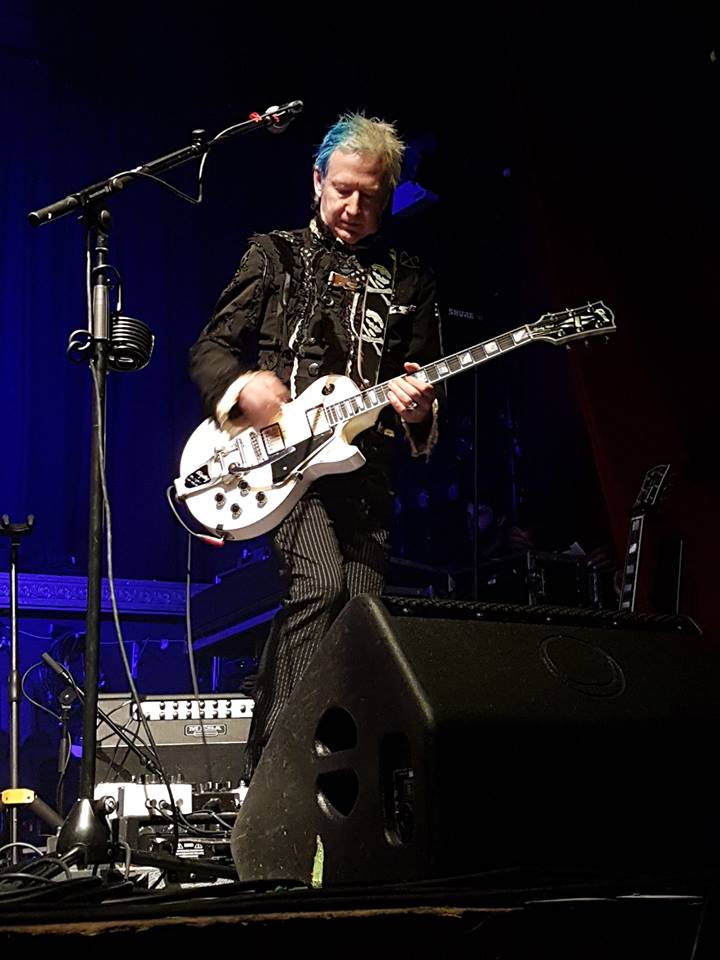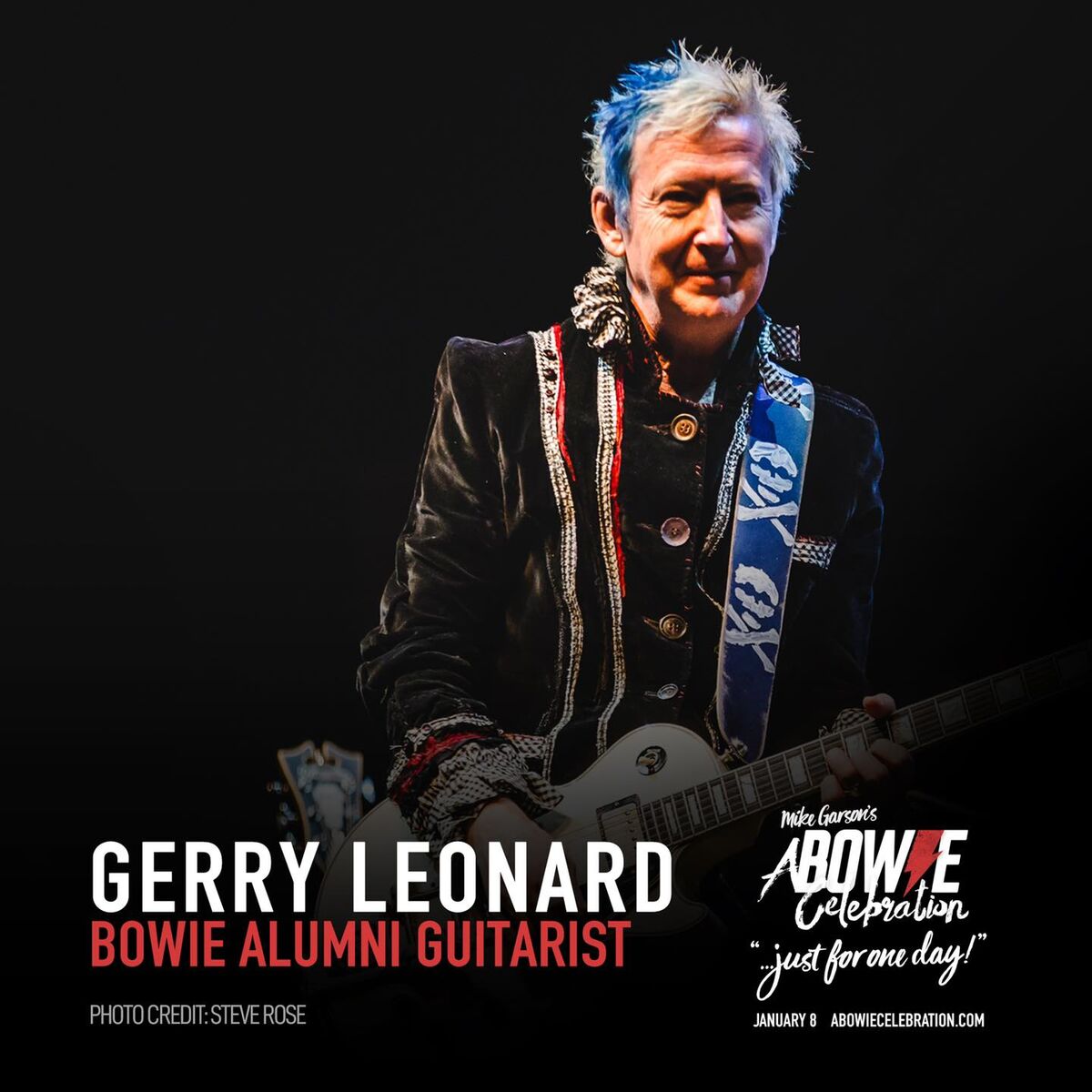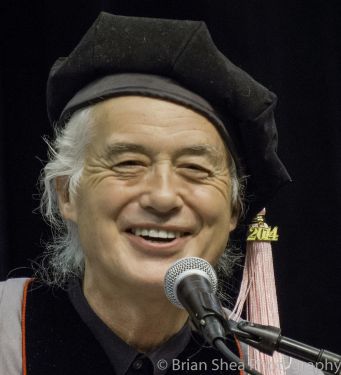If there is one essential thing at the core of any music artist's organizational skills, that it is time. The right time when to record a new album, when to plan to go on Tour to support the record and how to find the right time to do extra appearances as well at special occasions, such as Festivals, for example or collaborations with other fellow artists.
In the case of Irish Guitar Virtuoso Gerry Leonard, all the above get multiplied at least by ten, given the time that Leonard spends in co-writing songs, playing either as a studio and/or as a live musician and being the musical director of artists such as Suzanne Vega, Rufus Wainwright, Laurie Anderson and the late great David Bowie, among others.
The Irish artist, now based in New York, is one of the most acclaimed guitarists worldwide, thanks to his great musical vision, his craftmanship, his creativity and the way that Leonard is capable not just to express his unique vision about music but also to look beyond the infinite possibilities that music can offer, not just for his own projects (his best and most celebrated one went under the name of Spooky Ghost and produced two splendid albums released between 1998 and 2002), but also for all the aforementioned artists that, because of his multifaceted, extraordinary musical skills, keep asking to work with Leonard over and over again.
Bluebird Reviews has the privilege of talking to the Irish Guitar Maestro in-between his very rare moments off work, after Leonard has been involved in the European leg of the A Bowie Celebration's Tour (a wonderful project where most of the musicians that have worked with David Bowie are reunited together playing Bowie's most famous hits), been away to Australia and New Zealand touring with Rufus Wainwright and currently working, back in New York, with Leonard's long time friend and fellow musician Suzanne Vega.

BR - Hi Gerry and thank you so much for talking to us at Bluebird Reviews. These are particularly busy times for you, between the Bowie's Alumni Tour and your recent Tour with Rufus Wainwright. Given the amount of time you travel for work, how difficult is it to balance touring activity, family time and composing new music either for yourself or for fellow music artists?
GL - Yeah, it has been very difficult to balance everything, lately. You know, a lot of the work we are doing as musicians, these days, is touring. In a sense , I feel like the music business has shifted a lot from recording music to live music, therefore, a lot of artists I work with are On The Road and, right now, between the Mike Garson’s Alumni Tour, the Rufus Wainwright Tour and another artist I often work with, Suzanne Vega, it is indeed a pretty hectic schedule. It’s certainly difficult for my wife and daughter, because I am away a lot, internationally, then trying to schedule everybody’s touring, among other things, it is a bit tough. I don’t remember the last time I had a day off, to be honest with you (smiles). You know, if I think that I was in Europe in January, then I came home (Leonard is based in New York) and mixed a record, then I went to a series of rehearsals for upcoming projects, then went to Australia and New Zealand and then flying back all the way from Wellington on Monday and Tuesday back to New York starting working with Suzanne here in the Carlyle Hotel for two weeks residency.. I guess it is OK, it’s just about possible, so let’s do it, you know! But on the other hand, it is great to be working and I love playing live. It’s a real challenge and it’s very social and, you know, it’s nice to feel like you are engaging with audiences and not just being in a room, somewhere, recording in an abstract way. So, there are a lot of goods, about being busy too, you know.
BR - You have been asked countless times about your working (and personal) relationship with David Bowie and the times you have been working together on some of Bowie's later records. I was wondering, in view of that, what kind of emotional impact did the A Bowie Celebration's Tour made on you, re-uniting with old friends like Mark Plati and Mike Garson, among others and playing once again, on stage, the songs of one of the greatest artists of this century.
GL - I agree with you there, I think too that David’s work was astounding and his legacy only continues to get richer, in a sense. You know, there was a certain amount of healing that went on, I think, when we finally got back together to honor David at the Brit Awards, that was when we put the Reality band back together and we played a tribute with Lorde, singing Life On Mars! at the Brit Awards for David, the year that he passed away. That kind of re-kindled the sense that we all really enjoyed playing David’s music. Then, when the opportunity came around to actually tour the music, I had some mixed emotions, because it felt like, well, is it the right thing to do or is it this a form of cashing in, and, of course, nobody wants to feel like that, because David was a friend and a hero to us, so we didn’t want to feel we were being cheap, you know. But, at the same time, there was something really wonderful about playing David’s music with the musicians that we’d all played together with David and there was an authenticity about that. Then, when we did it and we actually started played our first proper show with an audience, I was amazed at how much the audience responded to it. I felt like the audience was the final ingredient that really seemed to make it feel like what we were doing, was the right thing to do. There was a sense of gratitude and a sense of tradition, coming from the audience; it was like they’ve gone to see David’s concerts and now they were coming to see the band and we were playing David’s music to, hopefully, a standard that David would approve. It turned into a night of real celebration and we would go out afterward and meet all the fans and chat with them, signing autographs, hear their stories and tell them few stories at the same time. So it became this great thing, you know. Mike Garson, being the oldest member of the band and the one that played with David the longest, is such a great man and he has got this open policy, with his personality and he is very inclusive, with all the different people who have played with David over the years. So, we have this really great kind of family and its rotating cast. I don't do all of the shows; when I am available, I do just some of them, the ones that seem the right thing to do and therefore, in that way, it keeps it fresh.
BR - You released, some time ago, under the Spooky Ghost's alias, two splendid albums that received numerous accolades from the music press and the fans. Understanding that collaborating and touring with the cream of the music business may take away a lot of your precious time, will we ever be able to hear again (and buy) a follow-up to that marvelous album that is The Light Machine?
GL - (Smiles) It's really a good question. You know, I do have another record that I have been working on. What happens for me is, because I've become so busy just working for other people, I think that, to a degree, you burn out a little bit on the feeling and the intensity that you need to bring to your own project, so to be able to bring it over the line and finish it. So, whereas I've been recording and writing and collecting songs over the years, I have almost got to the point where it's nearly finished and then I go off and either do somebody else's record or a tour or something like that. So, you know, I'd go away for two months and by the time I come back, I kind of forget what I was doing! Also, the idea of releasing a record now it's become so much saturated, I think. When you are the artist making your own record, you are also your own cheerleader, your own coach, your producer, your own label, everything and in these days, it's becoming increasingly harder to finish your own records. The healthiest part of the Spooky Ghost project, to me, is the fact that I still play it live and, when I am home, I would go down to this little club in New York, Rockwood and I would play a set of my own stuff, newer and older ones. I found that part of playing live the Spooky Ghost stuff a really creative outlet, which is where, fundamentally, where the whole project started from. I came from bands and I always wrote songs and when I started working as a sideman, I needed an outlet for my own creativity and Spooky Ghost was a way, for me, to enable again that need I had, as an artist, to write new songs. I really should finish that famous record that I told you of before, get over myself and just do it (smiles). Maybe, one day, I'll become unemployed and that will give me the opportunity to do another Spooky Ghost record!
BR - Your guitar playing style, although naturally evolving and progressing through the years, has always had (and still does) a very distinctive atmospheric element to it, that ability of telling stories in a song not necessarily through the lyrics but through the intensity of your guitar sound. As a young boy learning to play guitar, were you inspired by any fellow guitar player in particular or did you develop your own style naturally?
GL - I think it was a real combination of things that led to my playing style and its various influences. I learned to play guitar in a simple way. Initially, I learned folk songs and then, with my dad, I made an electric guitar and I started to learn electric guitar. One of my friends would show me the riff to Stairway To Heaven or whatever it was and, whether he played it correctly or not, it was like you were starting to collect all these little pieces of the heritage of the electric guitar. But I also studied classical guitar and I also worked in a recording studio, at one time. I was fascinated with recording. I think that, where all the pieces came together was when I moved to New York and I found myself in a sea of guitar players. I found that I needed to make my own style and figure out what i was good at and what I was not good at. I think that my style is an odd combination of Folk guitar, Rock guitar, Classical guitar and then this kind of idea about the production element of recording and the way that you can kind of create spaces and atmospheres and, as you said, being able to tell stories or open up emotional spaces in the music, with the sound of the guitar. I think that the guitar is a great instrument to use as the base for soundscapes, because it has got a lot of personality and a lot of overtone to it. So, you know, in a strange way, I think that the style that I have ended up with, it is this combination of elements, which is not your straight forward Rock'N'Roll guitar or a more traditional style of playing but something that has kind of developed naturally.
BR - Among all the famous music artists you have worked with, through the years, I feel personally that your fabulous playing style suites perfectly the concept of musical escapism that people like Laurie Anderson, David Bowie and Rufus Wainwright have, among all. May I ask you to define, in only one word, what each of the artists mean to you on a personal level and the kind of impact they gave to your musical formation?
GL - Wow, that is a tough question! (pauses for few seconds). I guess that the one that comes to mind and suit the artists you mentioned is "inspirational". Thinking about those artists you mentioned, for me it feels like coming across to art of the highest and finest level. They all are, in their own, unique way, the type of artists that inspire you to go out in the world and make art yourself. Their artistry has the power to take you out of the mundane and put you on a higher vibration, a symbolic plane that goes higher and higher and gives you the motivation to see the world and life on a wider scale.
BR - How challenging is the role of being the musical director for another artist, especially when it comes to find the right ground between accommodating the artist's requests and what is really materially possible?
GL - You know, in any project, we all want to know what the answers are and we all want to see the finished article to the highest degree. Leading on to that, there are a lot of decisions to be made and there are a lot of ideas and creative solutions that need to occur. I think that the hardest part is trying to understand an artist's vision and what they are looking for and trying to find those creative solutions I mentioned before that would help the project to materialize in the way that the artist wants. There is a time when there's a lot of grey area, in a new project, a lot of indecision or things that aren't quite fully developed and that can be uncomfortable, because all involved in such project are looking for answers. I think that it's key to try and listen to all the possibilities, the alternatives and sooner or later, the right idea will then develop and materialize. Also, in that way, by bringing collective ideas from the whole Team involved in the project to the artist, it will also, hopefully, convince the artist him/herself that what such artist is aiming for, is there and be done in a creative and organic way.
BR - Gerry, one of your greatest friends in show business Laurie Anderson once quoted that "As an artist, I'd choose the thing that's beautiful, more than one that's true". When it comes to music, do you share Laurie Anderson's view or do you rather have a different opinion on this subject?
GL - Well, that is an interesting quote indeed. I guess, in art, there is a licence not to be untrue but to be fantastical, you know. We can be a little more exaggerated, we can look for things that are maybe not really possible but we can pretend that they are possible in any art, such as film or music, for example. My interpretation of what Laurie tried to say, is that we can think big and then, of course, things may as well follow from that. It's almost like the idea that, you know, take something like science fiction, for instance, it may inspire science itself and then science may take the queue from that inspiration. It's like that place in our mind where we can dream and we can pretend big things and then, sometimes, those things may follow. It's that Secret Garden of our soul where art takes us on a journey and we relate to it in our own emotional way and through that, we are able to speak to different people through art and they will respond in their own personal way, still speaking though the same, universal language, that is the art of music. I find it really beautiful.


